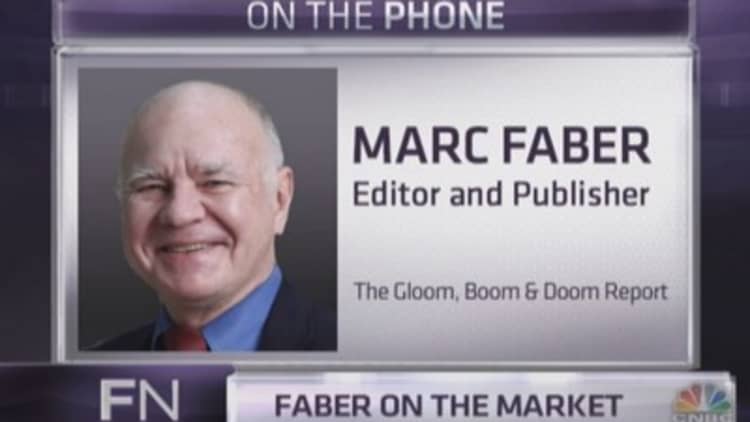
Marc Faber has long predicted that a collapse in U.S. stocks is coming. On Thursday he reiterated that call, saying there is fresh evidence that a bear market is ahead—courtesy of the Golden Arches.
On Tuesday, McDonald's reported that global same-store sales in August fell 3.7 percent in August, well short of expectations. The worst drop occurred in the Asia-Pacific region on the back of a Chinese meat safety scandal, but even U.S. sales slid 2.8 percent.
Read More McDonald's global same-store sales fall 3.7 pct in August
For Faber, those results are a perfect example of the damage being done by central banks—and the harbinger of more bad news to come.
"Nobody knows for sure" what will cause stocks to collapse, but "the earnings may disappoint. We had, essentially, very poor sales from McDonald's. Now, McDonald's is a very good indicator of the global economy. If McDonald's doesn't increase its sales, it tells you that the monetary policies have largely failed in the sense that prices are going up more than disposable income, and so people have less purchasing power."
Dr. Doom Marc Faber's investment strategy: 'Only lose 50%'
Faber has long argued that the policies of the Federal Reserve and other central banks simply increase asset prices and create inflation rather than actually stimulating the economy. But while the long-predicted inflation has not come to pass, Faber says that the McDonald's results reflect the fact that inflation is rising faster than income, reducing the amount that individuals can spend.
"Credit expansion and money printing hasn't filtered much to ordinary people. It's boosted asset markets, real estate and stocks," he said Thursday on CNBC's "Futures Now."
"So well-to-do-people have done very well. High-end restaurants are packed. Now, some money flows to people who are serving there, because well-to-do people give generous tips, but ordinary people have a much higher cost of living increase than 2 percent."
But even as most have seen their cost of living increase, according to Faber, median family income has hardly budged. That puts less-wealthy families—and the companies like McDonald's that are reliant upon them—in a tough bind.
Read More Wells Fargo's famous bear is now a bull—here's why
So if Faber's analysis is correct, how bad could it ultimately get for stocks?
"We've had a bull run since October 2011 without more than an 11 percent correction," he notes. "And now we're probably not going to get a correction, but more likely, a bear market that will be 20 to 30 percent at some point."
After all, Faber said that fewer and fewer stocks are making new highs, and a greater number are making 12-week lows, "so the technical picture of the market is not very good."
Add that to Faber's observation that "the U.S. is the most pricey market compared to other markets in the world," and he has constructed a bearish case.
—By CNBC's Alex Rosenberg
Watch "Futures Now" Tuesdays & Thursdays 1 p.m. ET exclusively on FuturesNow.CNBC.com!



